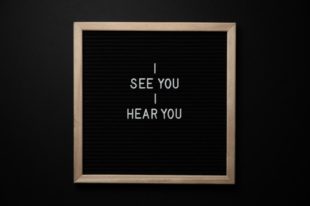Enriching Your Relationships with Effective Listening
Christian Counselor Spokane
In every vibrant relationship, there’s a bit of healthy back and forth. Between the banter, the jokes, the serious conversation about the things that matter, the relationship is being built and strengthened. When you can share what you care about with the people you care about, it brings a lot of joy.
 It can be frustrating when you are misunderstood, or you don’t feel heard at all – one of the worst feelings one can have in a relationship. Conversely, one of the greatest gifts we can give to the people who matter to us is to make them feel seen, heard, and valued. How would you go about doing this? One way is for you to practice better, more effective listening.
It can be frustrating when you are misunderstood, or you don’t feel heard at all – one of the worst feelings one can have in a relationship. Conversely, one of the greatest gifts we can give to the people who matter to us is to make them feel seen, heard, and valued. How would you go about doing this? One way is for you to practice better, more effective listening.
However good of a listener you may be, you can always use a primer or a refresher to improve your skills. And while most of us think that we are great listeners, the truth is we likely aren’t. According to a recent study by the management consulting company Accenture, our listening skills aren’t as good as we think they are.
While around 96% of the respondents believed that they were good listeners with the skillset to prove it, the perception and the reality are way off, and we wildly overestimate our listening ability. In other words, we could all do with a bit of help to become better listeners and gift our friends and family with our improved listening.
Why does listening well to others matter?
There are many reasons why listening well to others matters, not only in our personal relationships but at work too. There’s a saying that “You earn respect with your ears and lose it with your mouth” and it points to a deep truth. When we listen well to others, we develop a reputation that earns us respect. That’s because listening well to others tells people that they matter, and when people feel valued by us, that’s one way they start to respect us.
 On the other hand, when we rush to speak without listening, our words likely miss the mark in one way or another. Have you ever had a conversation with someone in which they answered a question that hadn’t been asked? It simply highlights that they weren’t listening and that they might not even know what they’re talking about.
On the other hand, when we rush to speak without listening, our words likely miss the mark in one way or another. Have you ever had a conversation with someone in which they answered a question that hadn’t been asked? It simply highlights that they weren’t listening and that they might not even know what they’re talking about.
When you listen to others, it communicates that you respect them enough to value their words. That appreciation and affirmation is an important building block in any relationship because we all want to feel like we matter to the people we care about.
Lastly, listening to people also permits them to think. When a person is speaking and given room to articulate their thoughts, they must figure out what they want to say for themselves. They need to process their thoughts, find the words to express them and shape them into coherent and meaningful sentences. Poor listening takes away a person’s space to express themselves fully.
Tips for effective listening
To practice effective listening, it’s important to remember that your goal is to truly hear what the other person is saying, and for them to leave the conversation having expressed themselves fully and feeling like they were heard.
Nothing is so frustrating as leaving a conversation with the feeling that much was left unsaid, or that you weren’t truly heard. The kind of listening we’re talking about is called effective or empathetic listening, and it can enrich your relationships in immense ways.
How we relate and listen to others consists largely of the verbal and non-verbal cues that communicate our investment in the moment and in what the other person is saying. The more invested you are and show yourself to be, the more you’ll hear what the other person’s true concerns are and help them to feel heard.
Non-verbal Cues
Some of the non-verbal cues we should pay attention to include:
Posture. Your body says a lot without you ever opening your mouth to utter a word. If when someone is talking to you, and your body is turned away from them, it may communicate that you aren’t interested in what they’re saying. Lying down, as opposed to sitting up and leaning in closer to them, may convey that you’re not taking what they’re saying very seriously.
If you pop your head into your colleague’s office, it may communicate that you’re not there for a long time and aren’t there to engage seriously with anything. The next time you’re talking with someone, take a moment to notice what your posture and what theirs is, and how posture may be shaping and coloring the conversation.
 Eye contact. In many cultures, giving someone full eye contact communicates that you’re being open, honest, and vulnerable with them. It conveys sincerity and that they are your focus. Keeping your eyes on someone can help them to feel that they are what your mind is preoccupied with, which helps immensely with feeling like what you’re saying matters.
Eye contact. In many cultures, giving someone full eye contact communicates that you’re being open, honest, and vulnerable with them. It conveys sincerity and that they are your focus. Keeping your eyes on someone can help them to feel that they are what your mind is preoccupied with, which helps immensely with feeling like what you’re saying matters.
Distractions. In our age of cellphones and smartwatches that connect us to our phones, our pockets and wrists are a treasure trove of distractions, and if we let them, they can interrupt conversations. If you find yourself looking at your phone or watching whenever a message or social media reply comes in, or you keep your laptop open in front of you while you’re talking, it communicates that you are not really giving the person you are with your full attention.
Pay attention to your surroundings, switch your phone to silent or “do not disturb” and put it away, switch off the television, or close your laptop’s lid. All of this says to the person who is talking to you that, “I’m here, with you, and nothing else in the world is more important right now”. In a world full of distractions, slowing down and being present is such a rare gift.
What your limbs (or other body parts) are doing. Connected with your body posture is being attentive to what your limbs are doing. Tapping your foot when someone is talking may convey impatience, just as nodding your head may communicate that you’re understanding, agreeing, or at least hearing what they’re saying, while crossing your arms may come across as slightly hostile. Narrowing your eyes might read as though you are closely scrutinizing what they’re saying in a judgmental sort of way or finding it offensive.
Our bodies “say” things all the time, even while we’re not using our words to say those things. Developing into an effective listener requires that we become more aware of our non-verbal cues and what they might communicate and learn to deploy those cues wisely.
Verbal Cues
Regarding some of the verbal cues of effective listening, some of these include:
Asking questions. Asking questions at appropriate times during a conversation helps us in at least two ways. First, it shows the other person that we’ve been listening to them and want to understand better. Secondly, by asking clarifying questions we actually do get to understand better. It can be demoralizing to leave a conversation and then have an issue down the road because the other person didn’t understand as much as we thought they did.
When you ask questions, it allows you to process what you’re hearing, and it gives the other person an opportunity to clarify and restate their thoughts. All in all, it helps everyone to be on the same page, something of immense value in both professional environments and personal relationships. Instead of listening in order to reply, listen to understand.
 Summarizing. After a person has said their piece, one great way to make sure you’ve understood what they said, and for them to see that you were listening, is to summarize what was discussed and ask them if the summary is accurate.
Summarizing. After a person has said their piece, one great way to make sure you’ve understood what they said, and for them to see that you were listening, is to summarize what was discussed and ask them if the summary is accurate.
When we summarize, we bring all the important parts of a conversation into a succinct statement, and if you’ve captured the concerns and thoughts of the other person accurately, they feel like you’ve heard what matters to them, and your summary indicates that you have grasped the issue.
Not interrupting them or finishing their sentences. One unhelpful practice is interrupting others or trying to finish their thoughts for them. In romantic movies, it seems being able to complete your partner’s sentences is a good sign that you’re compatible. However, in real life it can get frustrating to try and find the words to say something, only to have that thought process interrupted with unhelpful alternatives.
Sometimes, the words the other person uses may be mostly what you mean, but because they aren’t 100% what you intended, it may feel like they aren’t really your words. If a person is struggling to find words, let them struggle, and jump in to help only at their invitation.
Lastly, though this doesn’t fall neatly into a verbal or non-verbal cue as such, one helpful way to let a person feel heard is by not judging them or jumping to conclusions. This does at least two things.
In our own minds, when we judge or reach conclusions early, it closes us off from hearing the rest of what the person has to say. We thus only get half of a message. Jumping to conclusions usually works as a precursor to interrupting the other person or trying to finish their sentence/thoughts for them.
Listen in an open-minded way and ask questions to understand what they are saying. Effective listening is a skill that is challenging to learn and use in everyday life, but when we use it in our relationships, it is a gift for the people around us.
“I See You. I Hear You.”, Courtesy of Brett Sayles, Pexels.com, CC0 License; “Human Figure”, Courtesy of Amr Taha, Unsplash.com, CC0 License; “Preoccupied”, Courtesy of Roman Odintsov, Pexels.com, CC0 License; “#becurious”, Courtesy of Gary Butterfield, Unsplash.com, CC0 License





